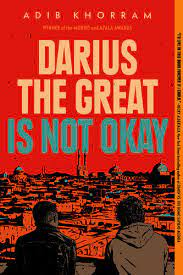Darius The Great Is Not Okay
Darius The Great Is Not Okay
Today, I am going to be talking
about the book, Darius the Great Is Not
Okay, by Adib Khorram. The book starts by introducing Darius Kellner, a
sophomore in high school in Portland, Oregon. He has a younger sister, named
Laleh, who is in second grade. Their father, Stephen, is from Europe, and their
mother, Shirin, is from Iran, and these parents immigrated to the US. Darius’s
father, who suffers from depression, constantly criticizes Darius in ways which
make Darius believe his troubles are his own responsibility. Darius's
ethnicity, as well as his physical and mental state make him a prime target for
bullying at school. But at home, he and his family are still connected to
Iranian tradition by talking to his mom’s side of his family through video
calls, as well as celebrating Persian traditions. Life is normal, until his
grandfather is diagnosed with terminal brain cancer, prompting Darius’s parents
to take their family to Iran for the first time. Having never been to Iran
before, Darius is extremely nervous, especially because he doesn’t know how to
speak Farsi, unlike Laleh or his mom. For the first few days, he is lonely, as
most of his family doesn’t understand what it means for someone to be
depressed. Enter Soharab, one of his neighbors. Soharab believes in Bahá'í, a
faith that is unpopular in Iran. This status as an outsider allows him to
connect to Darius, also an outsider, and truly know him for who he is. Soon,
they do everything together, from traveling to playing soccer and celebrating
festivals. As they spend more time together, Darius is reborn, as a more
energetic and happy person. But how does his family adapt to this new Darius?
To find out, read the book for yourself.
Personally, as both my parents are
immigrants from India, I feel like I can relate to Darius in the sense that,
when my parents take me to their home, I become a different person, with the
newfound freedom of being able to go visit relatives on my own, washing my own
clothes on my own, and being able to play sports with other kids my age. This
book highlights all the main points of visiting family abroad, and how it
allows Darius to connect to his roots, in the same way that it allows me to
connect to my roots.
Another key aspect of this story is
relationships. While I don’t want to give away too much, one of the hidden
beauties of this story is watching Darius and his little sister interact. They
clearly love each other very genuinely, and it’s sweet to see how they laugh
and play together. Darius feels self-conscious about playing with dolls and tea
parties with Laleh, but he doesn’t even care, because he loves his sister that
much.
This book isn’t exactly something
that puts you on the edge of your seat, nor is it something that will make you
fall asleep. It's a novel that you read, not for adrenaline, not for comedy,
not for romance, but for the satisfaction of watching this character grow and
develop to become so much more than you can even imagine. Reading this book is
like raising a child: there are ups and downs, and it isn’t a straight path,
but with that child growing into an adult, there is nothing that will make you
happier.
In conclusion, if you are looking
for a feel-good novel, just to blow a few hours, this is for you. If not, you
can forget this book exists. And on that bombshell, it's time to end. Goodbye.
-Sri


Hi Sri, nice blog post. It's good that when you go to India that you feel free. I personally don't really feel free when I go to China, but that's mainly because the times I do go, other people are still in school.
ReplyDeleteGood blog post Sri! This book seems like a real slow burner and emotional rollercoaster. I'll keep this in the back of my mind for when I want to read a book to just relax to.
ReplyDelete